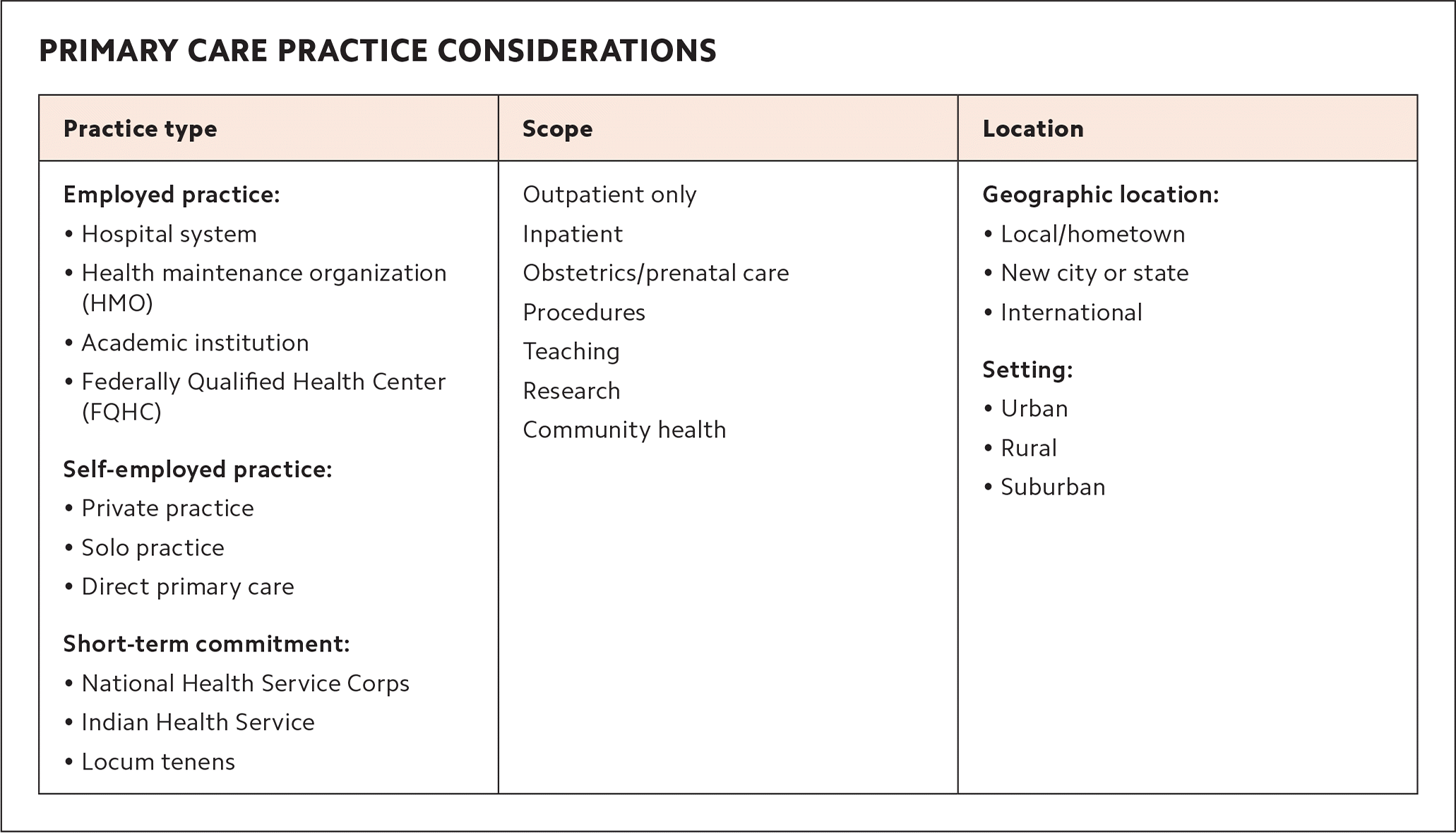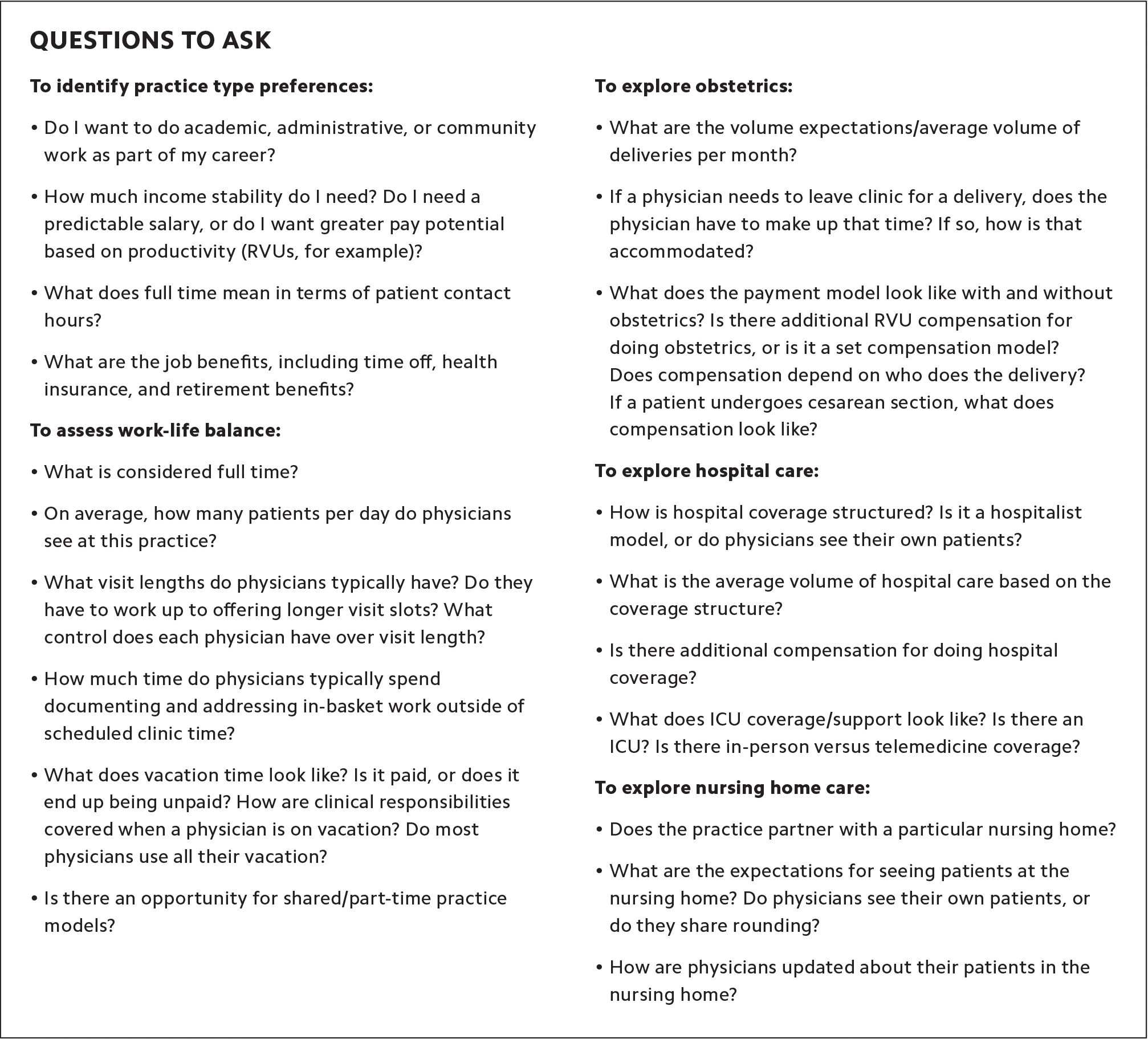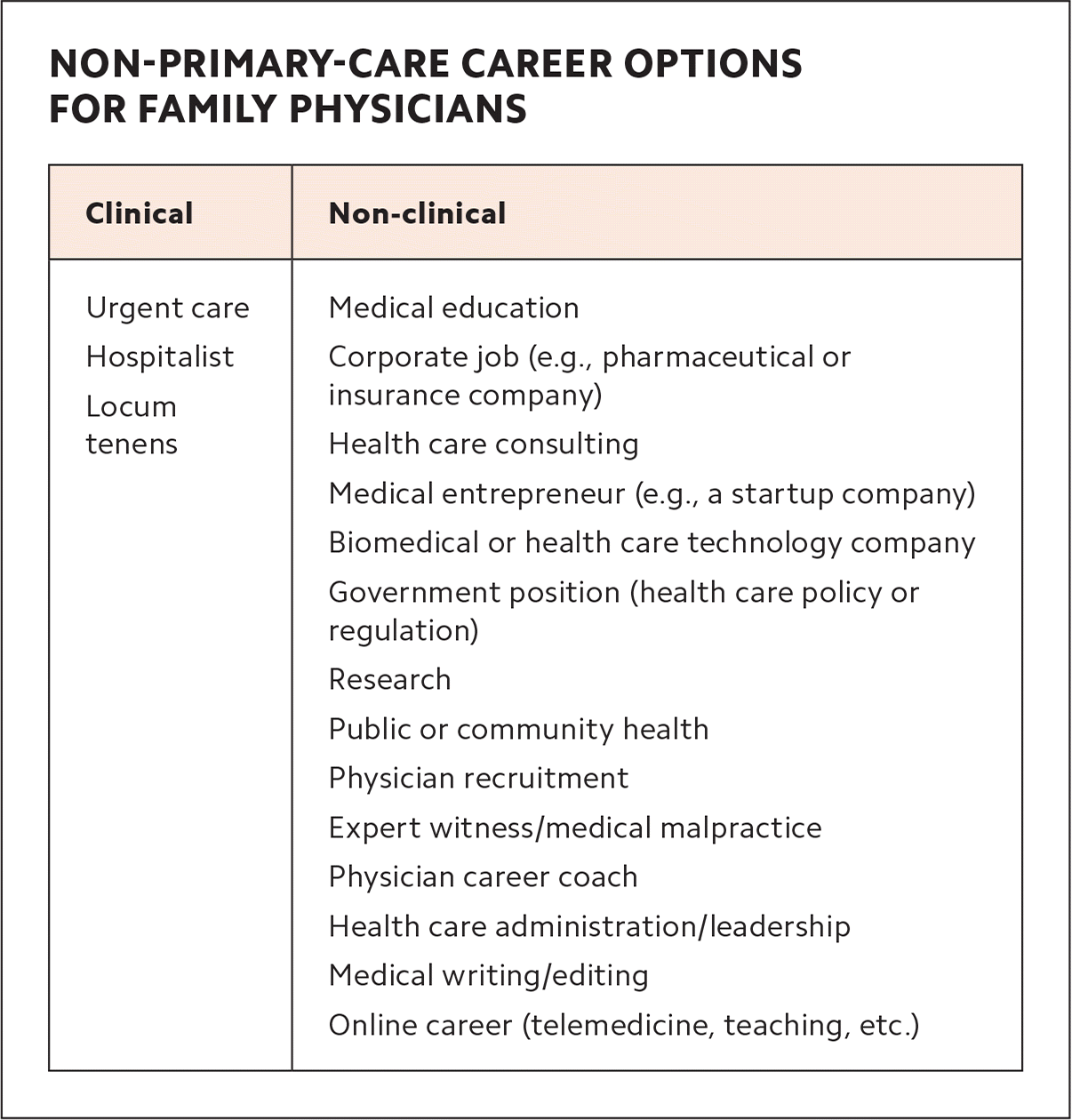
Your options are limitless, so start your job search with a clear understanding of your personal and professional interests.
Fam Pract Manag. 2021;28(5):30-35
Author disclosures: no relevant financial affiliations.

Choosing a job after residency is an important milestone in one's medical career and can also be an overwhelming decision. Practice patterns of new family medicine residency graduates have changed over the years, with fewer providing inpatient care, for example. According to a 2020 survey of family physicians three years post-residency, 99% provided direct patient care and 81% provided outpatient continuity care.1 About 65% of family physicians practice in the state where they completed residency, which is higher than most other specialties.2 Trends indicate that although recent family medicine residency graduates feel better prepared to provide a wide range of clinical services compared with a decade ago, they have a narrower scope of practice.3 Residents graduating from unopposed programs, where there is only a single residency program, and those practicing in rural areas are more likely to maintain a wider scope of practice.4
These trends may be related to changes in health care systems as well as applicants' preferences to balance work with other interests and demands. Regardless, it remains true that family physicians are in high demand and have many career options. The following cases highlight approaches to thinking through three types of job searches: 1) a traditional primary care physician job search, 2) a job search focused on balancing professional and personal values, and 3) a job search exploring non-primary-care job opportunities.
KEY POINTS
Family physicians are in high demand and have many career options today, including traditional primary care practice, jobs with greater flexibility in terms of scope and work-life balance, and non-clinical positions.
Personal and professional referrals and networking remain the most common ways to search for and find jobs.
Start your job search by thinking about your interests in three categories: practice type, scope, and location.
CASE 1: A TRADITIONAL PRIMARY CARE PHYSICIAN JOB SEARCH
Dr. Xena is excited to move closer to her family and has several options to consider in her hometown. She is planning to work full time while her partner stays home with their children. She has a few ideas about what she is looking for in a career but wants some guidance, so she decides to bring up some career questions during her meeting with a faculty mentor.
Unlike many universities or medical schools, her residency program does not have career counselors to whom residents can turn for advice. Residents in this situation are encouraged to reach out to a variety of people who can help with the process, such as program directors, faculty mentors, external recruiters, or their organization's own recruiters or human resources representatives. Even in the age of technology and social media, personal and professional referrals and networking remain the most common ways to find jobs.5
A faculty mentor encourages Dr. Xena to identify her initial interests in three categories: practice type, practice scope, and practice location. (See “Primary care practice considerations.”) Dr. Xena knows that she wants to be a primary care physician and does not plan to practice obstetrics. She likes inpatient medicine but is open to positions that are outpatient only. She wants to be in a metropolitan area near family but is unsure about practice type. She knows of a few job options: a position at a large university system, a position at a well-respected community system, and a position at a direct primary care (DPC) practice run by a former residency colleague. Dr. Xena also likes to teach and has enjoyed mentoring first-year residents and medical students, but she's not sure she is ready to be residency faculty. She and her faculty mentor decide the best next step is to meet with a recruiter. Working with a recruiter can be intimidating, so the faculty member offers some tips: Be up front about what you are looking for, be open-minded, and know that you do not have to commit to anything if the job does not meet your needs.

| Practice type | Scope | Location |
|---|---|---|
Employed practice:
Self-employed practice:
Short-term commitment:
| Outpatient only Inpatient Obstetrics/prenatal care Procedures Teaching Research Community health | Geographic location:
Setting:
|
By meeting with the recruiter, Dr. Xena learns important details about two of her options. The university system has openings for both residency faculty and full-time physicians at non-teaching clinics where the requirements to present and publish are less stringent. These latter physicians get to work with medical students on occasion, but most don't do any regular teaching in the residency clinics or on the inpatient wards. Clinic hours and visit lengths are standardized, and full-time status is defined as 30 patient-contact hours per week. The position is mostly salaried with only a small percentage of income determined by relative value units (RVUs).
In the community system, more of Dr. Xena's income would depend on the RVUs she generates, but she would have the ability to decide if she wants to be on a 15-minute schedule for most visits (30 minutes for more complex patients) or a 20-minute schedule (40 minutes for complex patients). Whichever she chooses, full-time status is defined as 32 patient-contact hours per week. Vacation time and health care benefits are equivalent between the university and community system, but the university system provides better retirement benefits.
Dr. Xena had a phone meeting with the owner of the DPC practice and thinks they would get along well. The opportunity to spend more time with patients appeals to her, but the decreased predictability in income makes Dr. Xena less drawn to this option at this point in her life.
After talking with several of her mentors and with her partner, Dr. Xena thinks through some key questions (see “Questions to ask”) to identify practice type preferences and decide which position to pursue. Job stability and income stability are key for her as she provides her family's only income and she and her partner both have loans to repay. She is hoping to become involved in teaching but wishes to start her career focused on patient care. She is excited about the opportunity to stay connected to a university, where she could be mentored by her colleagues. After meeting the clinic group at one of the university's non-residency clinics, she elected to interview there and was offered the full-time position.
QUESTIONS TO ASK

To identify practice type preferences:
To assess work-life balance:
| To explore obstetrics:
To explore hospital care:
To explore nursing home care:
|
CASE 2: BALANCING PROFESSIONAL AND PERSONAL VALUES
Dr. York has been passionate about obstetrical care throughout residency training but isn't sure it is compatible with the work-life balance she wants post-residency. She is struggling with how to ask future employers about this.
Dr. York isn't alone. The increased focus on balance and well-being in practice is largely a response to the epidemic of burn-out in medicine at large and primary care in particular. Across all professions, the younger generations tend to prioritize work-life balance when assessing career options,6 and many physicians are now choosing to work part time because a reduction in hours may reduce burnout and increase satisfaction in practice.7 Part-time practice options vary, from full days off during the week to shortened clinic days. Clinical responsibilities required of physicians who are not in clinic full time also vary. For example, they may be required to keep up on non-face-to-face tasks, such an in-basket management, which can often increase physician workload in a less visible manner.8 Job sharing with another clinician may facilitate continuity of care to a patient panel with part-time work.7
Although a broader scope of practice is associated with less burnout in early-career physicians,11 it can add complexity to work-life balance. Obstetrical care, hospital medicine, and nursing home care can make a job feel more or less balanced depending on how they are structured. It is essential that physicians ask about the various aspects of work-life balance when assessing the fit of their future practice options (see “Questions to ask”). Additionally, asking potential colleagues the simple question “What do you do in your free time?” can elicit helpful information about work-life balance. Those who have a ready answer likely have genuine time for life outside of work.
Dr. York does not want to work full time if possible and is considering two practices. Practice A seems to have physicians who have a lot of passions outside of work, but it does not offer part-time options. Only a few of its physicians practice obstetrics, so they are not required to make up missed clinic time due to deliveries. Practice B requires physicians to cover their own in-basket work every day even if they work part-time and to make up clinic time missed for deliveries. However, the practice is open to job sharing and has a physician who is looking for a job-share partner.
Dr. York ends up selecting Practice B, where another physician who does obstetrics can help share care. They will fully share patient coverage for both obstetrics and primary care, including in-basket coverage, with a flexible half day every week to make up patient care if they are pulled from the clinic for a delivery. This arrangement allows them to be free of clinical duties entirely three days a week while having a bustling obstetrics practice. Dr. York had to compromise regarding visit length, which was shorter than hoped for, but the trade-off is that physicians in the practice do not spend more than an hour per day doing work outside of their scheduled clinic sessions.
CASE 3: EXPLORING NON-PRIMARY-CARE JOB OPPORTUNITIES
Dr. Zo is finishing up residency and is excited about what lies ahead. He does not want to be a traditional primary care physician and is most interested in hospitalist medicine. However, for at least a year following residency, he will need to provide part-time care to a family member, so he is considering non-clinical career options that will provide more flexibility than traditional clinical jobs.
Non-clinical careers are becoming more common in an environment where physicians are facing higher levels of burnout and more virtual work opportunities, due in part to the pandemic. Dr. Zo approaches his program director, who points him to an online resource (https://www.nonclinicalcareers.com), which has information about non-clinical careers for physicians as well as a job board. Non-clinical opportunities for physicians include careers in medical technology, public health, health care policy, research, and writing (see “Non-primary-care career options for family physicians”).12–14 Physicians with prior clinical experience can be especially qualified for positions such as health care leadership or physician coaching.
Dr. Zo ends up making key contacts through some online forums and job listings and finds a flexible career working as a physician consultant for a health care technology company. He also picks up some urgent care shifts to keep his clinical skills fresh.
Following this transition year after residency, Dr. Zo is in a position to think about hospitalist work, but he is also eager to see different parts of the world. Dr. Zo connects with a physician recruiter and finds a six-month locum tenens job as a hospitalist on the West Coast, where he works eight-hour shifts 14 days in a row and then has 14 days off. He doesn't think this schedule will work long-term, but for the short-term he is excited about the clinical work, vacation time, and compensation package.
Following this six-month period, Dr. Zo decides he would like a change, so he finds another locum tenens position, this time practicing urgent care in New Zealand. Dr. Zo ends up spending the next two years there after a long-term position opens up, and he has no plans to leave.

| Clinical | Non-clinical |
|---|---|
| Urgent care Hospitalist Locum tenens | Medical education Corporate job (e.g., pharmaceutical or insurance company) Health care consulting Medical entrepreneur (e.g., a startup company) Biomedical or health care technology company Government position (health care policy or regulation) Research Public or community health Physician recruitment Expert witness/medical malpractice Physician career coach Health care administration/leadership Medical writing/editing Online career (telemedicine, teaching, etc.) |
HOW TO DECIDE
Although family physicians seem to be narrowing their scope of practice, their career path options seem to be expanding. While it is beneficial to have options and be able to tailor your job to meet your needs, increased options can also make it more challenging to decide. Some new residency graduates may feel like they need to find their “forever job” straight out of residency, which is a lot of pressure. It may be more realistic and feel less high stakes to go into the job search process with the goal of finding a position that will be suitable for the next three to five years, since data suggest that more than half of new physicians stay in their first job for fewer than five years.15
One helpful approach to decrease the stress of a job search at the end of residency is to use an individualized learning plan.16 This allows residents to explore their core values and evolving career priorities and to structure residency education accordingly.
Although no job is ever perfect and there will always be some amount of challenge in finding a job, the search process and ultimate outcome can be rewarding. Seeking support from mentors and advisors throughout the process, being prepared with questions, thinking about professional and personal priorities, and keeping an open mind to the many available options for today's family physicians will help the graduating resident find the best career fit.
